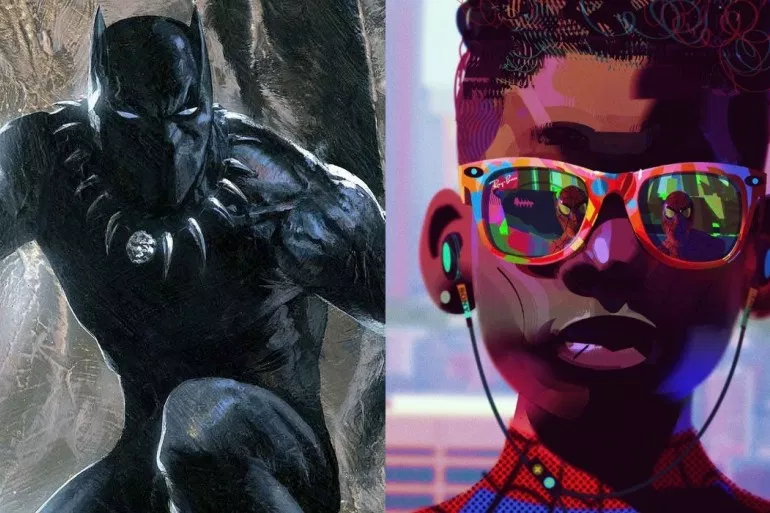Currently in an era where comic book movies and superhero films are the height of cinema and anticipating audiences. A role in a franchise like this is guaranteed a highlight in any celebrity or behind-the-scenes crew member’s career. These movies are the overall top grossing films every year, accumulating over millions of dollars domestically and internationally on opening weekends alone. Superhero films have progressed so much in the latest decade that it was only in 2018 that finally showcased black superheroes on the big screen. And what a wait that was worth.
Black Panther and Spider-Man: Into the Spider-verse are a major achievement in the struggle for diversity and positive racial representation in Hollywood. This was going to mean a lot of things to people that are not usually able to identify with characters that don’t look like them. Needless to say, the hype and expectations for these films were very high. When the films were respectively released, in the beginning, and end of the year, movie-goers and critics alike were ecstatic that these films not only broke racial boundaries but produced magnificent visuals, strong storylines, completely authentic characters, and overall memorable experience. From that moment onwards, Black Panther and Spider-verse didn’t only leave its mark for being one of the first black-lead superhero movies but also critically acclaimed films that set itself apart from other comic book films. And it is for this reason, among many, many more, that both films have entered the race into the 2019 awards season.
Awards season is a very prestigious and celebrated moment of each year. But it also becomes very snobbish – the films that are usually nominated are dramas and biographies, films that are very serious in nature. Awards season doesn’t hate fun or popular films like superhero movies. It simply doesn’t meet the serious standards among the esteemed board of film award voters. This isn’t to say that superhero films in the past were not nominated during awards season. It was about 10 years ago that The Dark Knight was the latest superhero film to infiltrate awards season. According to Forbes, the film “is widely — and rightly — considered one of the greatest superhero movies ever made.” Heath Ledger earned a plethora of acting nominations and wins for his infamous portrayal of The Joker, including winning the Academy Award for Best Actor posthumously. The Dark Knight not only cemented Heath Ledger as a legend – but it also greatly influenced the future of the Academy Awards. In all its glory, The Dark Knight failed to earn a Best Picture nomination, which many still regard as one of the biggest Oscar snubs in history. The Guardian reported at the time that “there remains the sneaking suspicion that many voters refrained from nominating The Dark Knight not because they did not believe it to be a great film, but because they did not believe it to be the right sort of great film.” The backlash of critics and dedicated movie fans over The Dark Knight’s snub forced Academy voters to change its approach in nominations: the number of films within the Best Picture category increased from 5 nominations to 10.
Fast forward to 2019 and two importantly influential films have entered the ranks of the Academy Award nominations. Black Panther and Spider-verse are definitely more than token films to add diversity in the award film roster. Black Panther broke the cookie-cutter formula of superhero films and was deservedly recognized. The film had earned 7 Academy Award nominations - including the honorable Best Picture nomination - and, for the most part, has been leading this awards season victoriously. “We’re ecstatic that Black Panther has received a Best Picture nomination from the Academy. It’s a culturally historic moment for moviegoers and for the genre,” says Gil Robertson, co-founder, and president of the African American Film Critics Association. The film drew all of its inspirations from multiple African countries; the fictional land of Wakanda and its tribes were constructed with careful consideration and delicacy to other African countries’ cultural items and traditional designs. This makes its nominations even more important. Black Panther is nominated for Best Original Music Score that included traditional Senegalese drums and Ugandan war chants, Best Costume Design that paid tribute to all the different cultural garments and patterns, Best Production Design by acclaimed designer Hannah Beachler - making her the first black woman to be nominated in this category - as well as Best Sound Mixing and Best Sound Editing.
On the animated end of the film spectrum, Spider-Man: Into the Spider-verse has been similarly breaking its own barriers both in animation and overall comic book films. If superhero movies are becoming an overwhelming trend, then the Spider-Man storyline is repetitive. There have been 3 Spider-Man film reboots over the last decade, spanning almost eight movies and retelling the same origin story. “With great power comes great responsibilities” – and so a huge responsibility came from the team to completely spin the tired web slinger’s history. Spider-verse follows Miles Morales, a 13-year-old boy that – yes, you’ve guessed it – gets bitten by a radioactive spider and gains abilities to fight crimes in New York. But an important part of Miles’ life to take note of is that he is Afro-Latino; this makes him the first black Spider-Man on screen. His casual code-switching to Spanish and accurately represented the Brooklyn neighborhood make him more than just a token key character. It’s the homeliness of how his lifestyle is portrayed that connects viewers to an endearing character, rather than just a ‘black version’ of the same superhero.
Bob Persichetti, Peter Ramsey, and Rodney Rothman direct a genius screenplay by Rothman and Phil Lord. Due to a malfunction from a dimension-altering machine, Miles meets Spider-heroes from alternate universes. Here, Rotham and Lord play with the mythology of the Spider-Man, truly shedding light on the traits of the hero the public first fell in love with. It’s the self-awareness of the reboots and the creativity of the team from Sony Animations Studio that pushes this film even further from its standard perspective. The animation in this film is especially noteworthy as it “pays homage to classic comic book style in the way that it plays with where your eye is trained to go,” according to Vox. Producer Christopher Miller said in an interview with Collider that the film uses a new process that treats CGI with “line work and painting and all sorts of comic book techniques” in order to create what they call a “living comic book” - with thought bubbles, comic frames, written sound effects, and the popularized 1960’s Ben-Day dots. Each alternate Spider-hero is also animated in a different technique style, distinguishing them and their respected universes further while also appreciating animation as an art form much more. Miles Morales’ story is a fresh take on a tale told one too many times and the medium it was delivered had stretched the limits of visuals, fight scenes and the animation genre that is always downplayed for only being enjoyed by children. This is how the wild script and the risky animation work hand in hand to deliver one of the greatest superhero films.
Like Black Panther, Spiderverse has been winning almost all of its nominations this awards season. Peter Ramsey becomes the first black director behind such an awarded animation feature. With this trajectory, Spiderverse could dethrone Disney-Pixar’s streak of consecutively winning Best Animated Feature Film at the Oscars. Another trend to break that people are focusing on is Black Panther actually winning Best Picture. Up against films that check all of the usual awards season boxes - Bohemian Rhapsody, Vice, The Favourite, Roma and Green Book – Black Panther makes this competition historically more interesting. Superhero films have the potential to be much more than popular movies. By not only breaking the racial barriers within the comic book genre, Black Panther and Spider-verse prove that their brilliance is beyond their blackness. Racial representation is important, especially in a time like this, and filmmakers are beginning to ensure that good content becomes part of the priority in projects like these. The cliché of ‘being an honor to be nominated’ becomes a defining moment for Black Panther and Spiderverse and its impact on films from the comic book genre.


